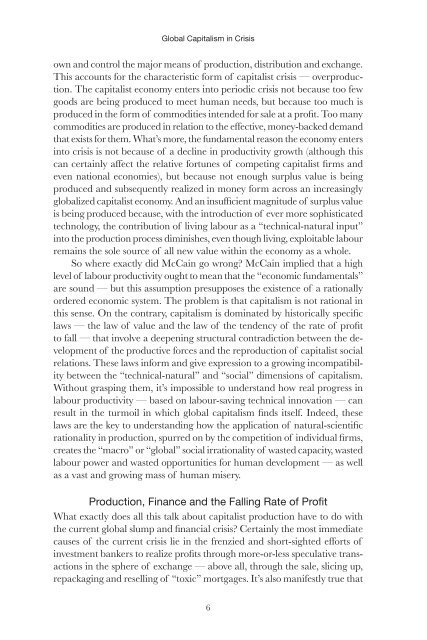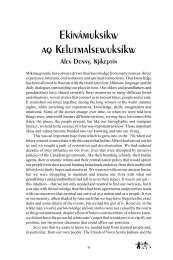The Global Economic Crisis — A Marxist Perspective - Fernwood ...
The Global Economic Crisis — A Marxist Perspective - Fernwood ...
The Global Economic Crisis — A Marxist Perspective - Fernwood ...
You also want an ePaper? Increase the reach of your titles
YUMPU automatically turns print PDFs into web optimized ePapers that Google loves.
<strong>Global</strong> Capitalism in <strong>Crisis</strong><br />
own and control the major means of production, distribution and exchange.<br />
This accounts for the characteristic form of capitalist crisis <strong>—</strong> overproduction.<br />
<strong>The</strong> capitalist economy enters into periodic crisis not because too few<br />
goods are being produced to meet human needs, but because too much is<br />
produced in the form of commodities intended for sale at a profit. Too many<br />
commodities are produced in relation to the effective, money-backed demand<br />
that exists for them. What’s more, the fundamental reason the economy enters<br />
into crisis is not because of a decline in productivity growth (although this<br />
can certainly affect the relative fortunes of competing capitalist firms and<br />
even national economies), but because not enough surplus value is being<br />
produced and subsequently realized in money form across an increasingly<br />
globalized capitalist economy. And an insufficient magnitude of surplus value<br />
is being produced because, with the introduction of ever more sophisticated<br />
technology, the contribution of living labour as a “technical-natural input”<br />
into the production process diminishes, even though living, exploitable labour<br />
remains the sole source of all new value within the economy as a whole.<br />
So where exactly did McCain go wrong? McCain implied that a high<br />
level of labour productivity ought to mean that the “economic fundamentals”<br />
are sound <strong>—</strong> but this assumption presupposes the existence of a rationally<br />
ordered economic system. <strong>The</strong> problem is that capitalism is not rational in<br />
this sense. On the contrary, capitalism is dominated by historically specific<br />
laws <strong>—</strong> the law of value and the law of the tendency of the rate of profit<br />
to fall <strong>—</strong> that involve a deepening structural contradiction between the development<br />
of the productive forces and the reproduction of capitalist social<br />
relations. <strong>The</strong>se laws inform and give expression to a growing incompatibility<br />
between the “technical-natural” and “social” dimensions of capitalism.<br />
Without grasping them, it’s impossible to understand how real progress in<br />
labour productivity <strong>—</strong> based on labour-saving technical innovation <strong>—</strong> can<br />
result in the turmoil in which global capitalism finds itself. Indeed, these<br />
laws are the key to understanding how the application of natural-scientific<br />
rationality in production, spurred on by the competition of individual firms,<br />
creates the “macro” or “global” social irrationality of wasted capacity, wasted<br />
labour power and wasted opportunities for human development <strong>—</strong> as well<br />
as a vast and growing mass of human misery.<br />
Production, Finance and the Falling Rate of Profit<br />
What exactly does all this talk about capitalist production have to do with<br />
the current global slump and financial crisis? Certainly the most immediate<br />
causes of the current crisis lie in the frenzied and short-sighted efforts of<br />
investment bankers to realize profits through more-or-less speculative transactions<br />
in the sphere of exchange <strong>—</strong> above all, through the sale, slicing up,<br />
repackaging and reselling of “toxic” mortgages. It’s also manifestly true that<br />
6





